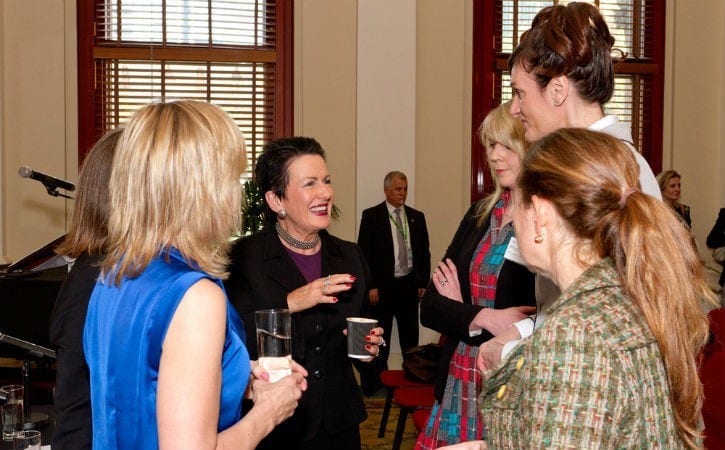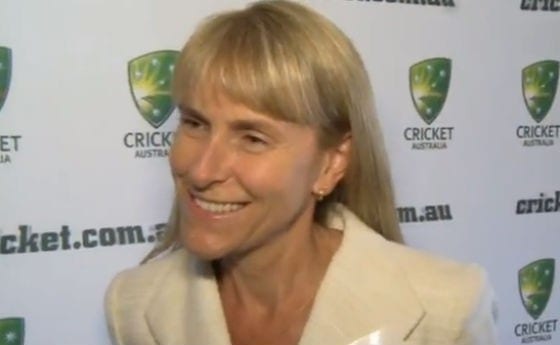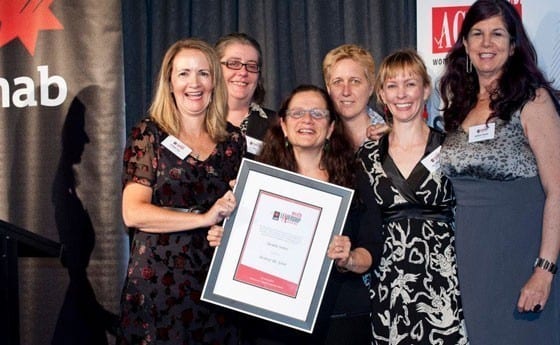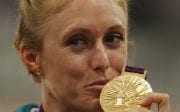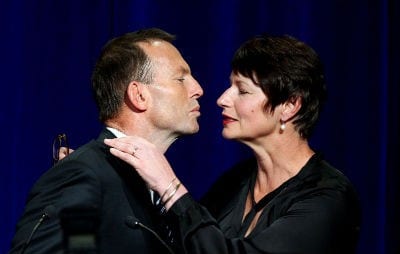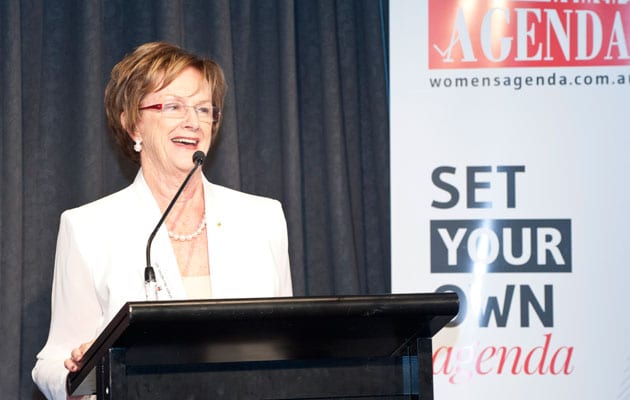One year ago Women’s Agenda was launched to “give a voice to career-minded women“.
In the year that’s passed the 17.5% gender pay gap remains firm and the number of women in power in politics and business has sadly not progressed all that much, especially with the loss of our first female Prime Minister.
But it’s still been a year of some progress and a number of firsts: the first female board member of organisations such as Cricket Australia and Fortescue Metals (the last of the ASX 50 to do so), the rise of a social movement that’s given voice to a new generation of female activists, and of course that misogyny speech that opened up a public dialogue about discrimination in the workplace.
We take a look at the milestones and celebrate the year that’s passed since Women’s Agenda launched.
Women’s Agenda officially launches at Sydney Town Hall with Lord Mayor Clover Moore.
The launch also coincided with a number of notable appointments including Holly Kramer who was appointed CEO of Best & Less and Susan Lloyd-Hurwitz who took on the role of CEO at Mirvac

September was Equal Pay Day, highlighting the persistent 17.5% gender pay gap and the fact that women still have to work around 64 days more than men in order to earn the same amount.
Penny Wong moved to take on the lack of women on boards. Speaking at a CEDA Women in Leadership lunch, the minister for finance said it was one thing to talk about gender equity, another thing to act on it.
“It is an issue of ability … If we’re not fully utilising the capacity and talents of over half of the population, then we’re holding ourselves back.” she said.
In an address that opened up a debate on the issue of sexism in politics, Anne Summers delivered an impassioned speech addressing the “political persecution” of Australia’s first female prime minister.
Summers spoke about the double standards applied to Gillard and the treatment in the media and from the opposition. But the gender-based attacks on Gillard only progressed as her term went on.
Over the past 12 months we’ve spoken often on the need to improve women’s participation in sport and secure more women in leadership positions. In a boost to the world of sport, Jacqui Hay became the first female director at Cricket Australia in August. Later in the year she spoke with Women’s Agenda following her first board meeting, telling us she was very conscious of being the only woman on the board.
“I know how other women feel about my appointment to this board, and I have an extra responsibility to represent them,” she said.
With the rising presence of social media, so too came unparalleled public commentary. When Alan Jones hit headlines in September with his ‘destroying the joint’ comments, and later when he declared Gillard’s father had “died of shame”, the subsequent public backlash saw a (temporary) loss of advertisers to Jones’ 2GB show. It also unified the voice of women and demonstrated the power of a new social movement through the formation of #destroythejoint, and a platform for women and men to publicly call out sexism.
And Jones wasn’t the only person taken to task by social media. Following Leigh Sales’ interview with Tony Abbott in which she grilled the Opposition Leader on whether or not he had read a BHP Billiton statement, the reaction to her interview, including comments from Liberal party strategist Grahame Morris who called Sales a “cow”, shed light on the deep rooted issue of sexism displayed toward strong female figures.
Sales made the news again when she was invited to interview outgoing US Secretary of State Hillary Clinton in her farewell interview, where Clinton conceded there is still a double-standard attached to women in politics.
“That exists from the trivial, like what you wear, to the incredibly serious, like women [who] can’t vote” she said.
Women’s Agenda also celebrated the London Olympics, and while it was a disappointing year for Australia’s medal tally, we joined in the celebration of Australia’s first gold win thanks to sprinter Sally Pearson.
Politicians have never been far from the spotlight, and October was the beginning of Tony Abbott’s ‘woman-friendly’ campaign. In a bid to appeal to ‘women voters’, Abbott rolled out the women in his life to promote his feminist side and prove that he doesn’t have a problem with women.
The effects of the campaign were short lived however, as days later Julia Gillard delivered a stinging attack on Tony Abbott during parliament, accusing the Opposition Leader of sexism and misogyny. It was the speech that went viral and continues to be referenced as a groundbreaking moment for women calling out discrimination in the workplace.
Meanwhile, in the US both political parties were vying to secure the women’s vote, with Barack Obama and Mitt Romney also rolling out their other halves to proclaim their feminist side. At the time Jane Caro wrote of the election “it is women who have really decided this election … Even here in Australia, uppity owners of uteruses were making older white blokes nervous.”
Obama won – with 55% of the women’s vote – and the powerful force of the female vote showed a sign of things to come as we head toward the polls on September 7th.

Former PM Gillard looked to be watching the US election campaign closely. In December Women’s Agenda editor Angela Priestley was invited to join other female editors, journalists and bloggers for a meeting with Gillard as part of her “strategy” to woo female voters.
With women’s issues at the forefront for both parties, their policies (particularly concerning parental leave, childcare and equal pay) have remained a focal point for Women’s Agenda.
In January the Coalition reinvigorated its paid parental leave policy that would see mothers paid their regular wage for six months following the birth of a child, capped at $75,000. The scheme is considerably more generous than what’s currently on offer under the Labor government – paying the minimum wage to women for up to 18 weeks.
Also in January media trailblazer Ita Buttrose was named Australian of the Year. In an earlier interview with Women’s Agenda she said that it’s been an “exciting time” to be a woman.
“I married and had children but kept on working, becoming part of women’s changing world, much of which was driven by the arrival of women’s liberation” she told us.
In early 2013 the number of senior women in politics took a hit when Nicola Roxon, the first woman Attorney-General resigned from Gillard’s ministry, saying that it is “normal for women to scale up and down their work or careers at different times in their lives”.
On International Women’s Day, Women’s Agenda celebrated the inaugural NAB Women’s Agenda Leadership Awards, highlighting the achievements of entrepreneurs, business women and innovators who are creating change and setting the pace for leaders of the future. Wendy McCarthy was invited to join the Women’s Agenda hall of fame.
In March 2013 Gillard delivered a national apology to mothers of forced adoptions, a speech which was later overshadowed by Simon Crean’s declaration that Gillard call a spill of the Labor leadership.
And as we edged closer to the fall of our first female prime minister, 2013 was already shaping up to be a “terrible year” for women in power, with just 16% of new board appointments going to women.
Still, strides continue to be taken to improve the presence of women in sport. In June, the AFL announced the first women’s round and Raelene Castle joined NRL Canterbury bulldogs as CEO.
Following on the heels of Anne-Marie Slaughter’s ‘have it all’ discussion came Sheryl Sandberg’s tome to working women: Lean In: Women, Work, and the Will to Lead. Along with the book began a broader discussion on the efforts women can take to personally ‘lean in’ to their careers and help close the gender gap.
In a move campaigners hoped would encourage other large companies to follow behind, NAB announced its domestic violence leave policy in a bid to encourage its staff, more than half of whom are women, to feel comfortable about coming forward if they are victims of violence.
Women’s Agenda also celebrated the launch of partner content site Select Employer, highlighting the workplace diversity initiatives of some of Australia’s biggest companies.
In early 2013 Sex Discrimination Commissioner Liz Broderick continued to champion women’s rights by leading a review into sexism in the ADF. The report revealed that one in four women in the ADF had experienced sexual harassment in the past five years.
The ADF was publicly shamed again after it was alleged that demeaning emails had been sent by members in the army. Army chief David Morrison delivered a benchmark speech, imploring sexists that they could get out of the army if they couldn’t adhere to proper workplace standards.
“I will be ruthless in ridding the army of people who cannot live up to its values. You may find another employer where your attitude and behaviour is acceptable, but I doubt it”.
But perhaps the most significant milestone of the past year was the demise of Australia’s first female PM. All year, Gillard’s treatment has sparked plenty of discussion regarding whether Australians have some work to do on accepting women in power. As Gillard herself noted on the night she lost her job: “The reaction to being the first female prime minister does not explain everything about my prime ministership, nor does it explain nothing about my prime ministership … It explains some things and it is for the nation to think in a sophisticated way about those shades of grey.”

